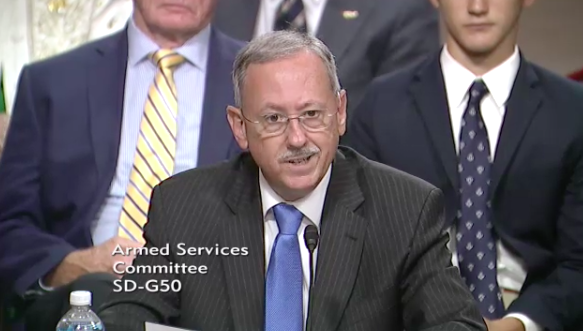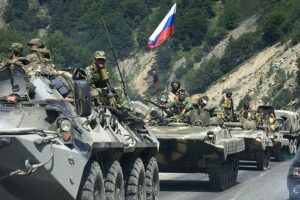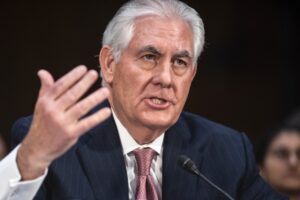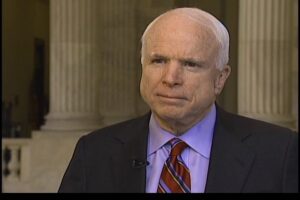Trump Policy Nominee Boosts Nukes, Slams Russia
Posted on

David Trachtenberg testifies to the Senate at his confirmation hearing.
CAPITOL HILL: President Trump’s pick for the No. 2 policy job in the Pentagon, David Trachtenberg, endorsed new nuclear delivery systems, praised NATO and allies in general and took a hard line towards the Kremlin in his confirmation hearing today. Responding to senators’ questions, Trachtenberg said Russia should pay “a cost” for meddling in the 2016 elections and twice said he disagreed with pro-Russia statements by Secretary of State Rex Tillerson.

Air-Launched Cruise Missile (ALCM)
Trachtenberg seemed to go beyond Defense Secretary Jim Mattis in endorsing the Long-Range Standoff Weapon, the proposed replacement to the aging nuclear-tipped Air-Launched Cruise Missile. Mattis has been uncommitted about LRSO so far, but in written testimony to the Senate Armed Services Committee released this morning, Trachtenberg wrote that ALCM “makes a unique contribution to U.S. nuclear deterrence (and) if the United States is to retain the capabilities that the ALCM currently provides, I believe the Long-Range Standoff Weapon (LRSO) will be a necessary element of the bomber leg of the U.S. nuclear triad.”
Since nominees’ written testimony is meticulously vetted, this thumbs-up to LRSO is probably an intentional signal from the Pentagon, perhaps even a hint as to Mattis’s evolving position, and not just Trachtenberg’s personal opinion as an expert in nuclear arms control and deterrence. That said, Trachtenberg does leave himself an out by saying we need LRSO “if” we want to retain ALCM’s capabilities. The ongoing Nuclear Posture Review, he notes, “will consider US plans for retaining cruise missile capability” — which suggests that getting rid of nuclear cruise missiles altogether is at least theoretically an option.
 Trachtenberg also endorsed upgrading the F-35 Joint Strike Fighter to carry nuclear weapons (so-called dual capability) as quickly as possible and deploying nuclear weapons to Europe. His desire for a powerful nuclear force fits seamlessly into his strong support for NATO, his marked distrust for Russia, and his belief that the US must play a central role in global security — all positions at odds with past Trump statements both on the campaign trail and from the White House.
Trachtenberg also endorsed upgrading the F-35 Joint Strike Fighter to carry nuclear weapons (so-called dual capability) as quickly as possible and deploying nuclear weapons to Europe. His desire for a powerful nuclear force fits seamlessly into his strong support for NATO, his marked distrust for Russia, and his belief that the US must play a central role in global security — all positions at odds with past Trump statements both on the campaign trail and from the White House.
“NATO is a major source of political will and operational capability that enables the United States to more effectively deter and counter threats to our national security,” Trachtenberg wrote, praising the alliance’s support for US interests in Europe, Afghanistan, and elsewhere. He also noted that “our NATO Allies are taking concrete steps to share the burden of common defense,” in contrast to Trump’s repeated public protests they’re paying less than they might (which is also true: All the NATO allies have pledged to increase their contributions to at least 2 percent of their GDP by 2024, but the US spends about 3.6 percent).
Overall, “the United States plays a unique role in the world as a guarantor of security in key regions and as an ally and partner to many nations. We do so to protect our national interests,” Trachtenberg wrote. “Protecting the U.S. homeland, U.S. citizens, and our allies and interests abroad remains a paramount, strategic vital interest.” That kind of internationalism is, again, at odds with America-First rhetoric from Trump and advisors like Steve Bannon.

Rex Tillerson
As for Russia, which Trump and Secretary of State Tillerson have often courted as a partner, Tratchenberg was withering in his oral testimony. In his opening statement, he devoted more detail to Russia than any other threat, saying that “Russia has invaded a neighbor whose territorial integrity it pledged to respect, violated its arms control treaty commitments, and threatened NATO allies with nuclear attack.”
Minutes later, the committee’s Republican chairman, John McCain, asked pointedly: “Mr. Trachtenberg, last week Sec. Tillerson commented that Russian and American objectives in Syria are, quote, ‘exactly the same.’ Do you agree?”
“No, sir, I do not,” Trachtenberg said.
“Do you believe that a Syria led by Assad or a member of the Assad family” — which Russia has spent blood and treasure to prop up — “is an acceptable outcome?”
“I believe that is an unacceptable outcome,” Trachtenberg told McCain.

Sen. John McCain, R-Ariz., chairman of the Senate Armed Services Committee
Sen. Elizabeth Warren, a Democrat, followed up by asking about another Tillerson statement about Russia’s role in Syria from the same press conference: “Maybe they’ve got the right approach and we’ve got the wrong approach.”
“I do not understand the context in which the secretary made that statement,” Trachtenberg began with a modicum of caution, “but taking it on face value, I would have to disagree with that. I think Russia’s objectives in Syria are clearly antithetical to our objectives. I believe Russia has propped up the Syrian regime. It has been the greatest enabler of Bashar al-Assad’s atrocities there against his own people. Russia has worked with Iran to destabilize the region. Russia has also threatened to shoot down American planes.”
“I see that as quite troubling,” he concluded.
Sen. Richard Blumenthal, another Democrat, picked up the theme and broadened it beyond Syria, asking “you would agree with me that Russia is a dangerous adversary to this country?”
“I would, senator,” Trachtenberg said without hesitation.

Emblem of Russian military intelligence (GRU), believed to have masterminded the 2016 attacks on the US elections.
“And the (fact of an) attack by Russia on our democratic institutions has been accepted by the Intelligence Community,” Blumenthal continued. “Do you agree that Russia purposefully attacked our democracy during the 2016 elections?”
“Senator, I have no reason to doubt the conclusions of the intelligence community,” Trachtenberg said.
Do those attacks amount to an “act of war”?
“I would be somewhat reluctant to use the term of act of war, only because I do not know if that implies some legal connotations,” Trachtenberg said. “It was certainly a hostile act. And I would say an attack like that in the cyber realm does not, in my view, need to be defined as an act of war in order to merit an aggressive response.”
Should we impose a cost on the Russians to deter them from doing this again?
“Yes, sir, I believe there needs to be a cost.”
“Would you agree,” Blumenthal went on, “that the sanctions bill that passed the Senate by an overwhelming bipartisan vote, 98-2, is an important tool…the President should sign?”
“I agree that it is an important tool, Senator,” Trachtenberg said. He did not, notably, say whether the President should sign the bill — that would wildly overstep his role as a sub-cabinet official who’s not even been confirmed.
But otherwise Trachtenberg hardly hesitated to give his blunt assessments. As Sen. Angus King said, “you are one of the most candid witnesses we’ve had.”
Sen. McCain promised to advance the nominations of Trachtenberg and his fellow nominees testifying today, pledging to “fight” and “force a vote” if the Senate’s Democratic leadership tries to block them.
Colin Clark contributed to this story.
Subscribe to our newsletter
Promotions, new products and sales. Directly to your inbox.
